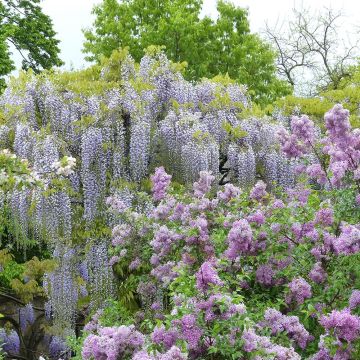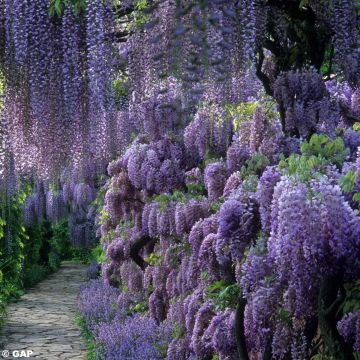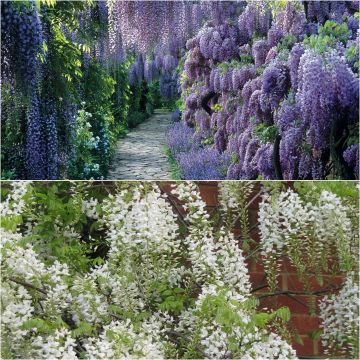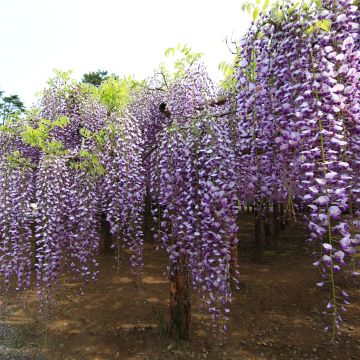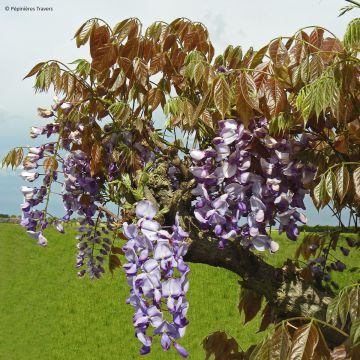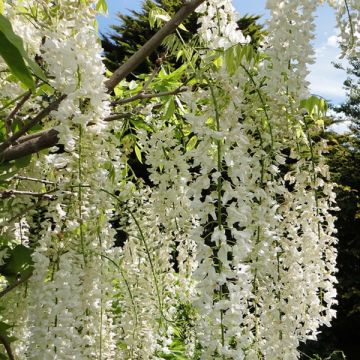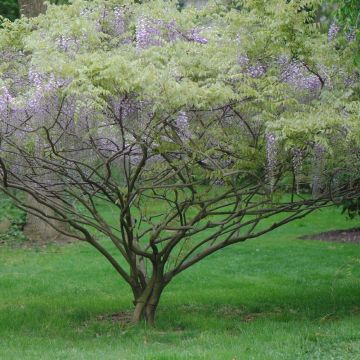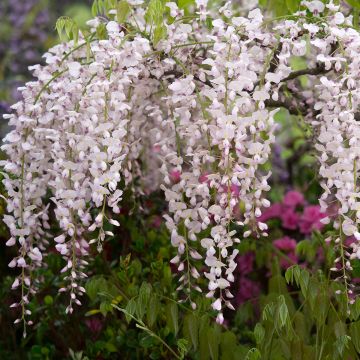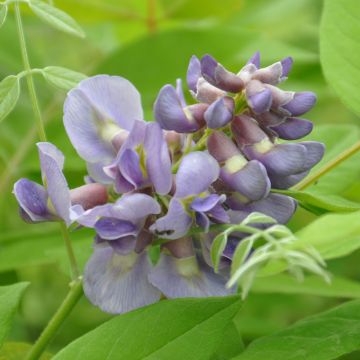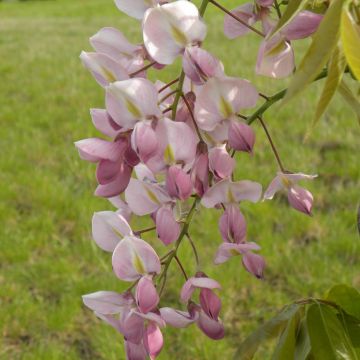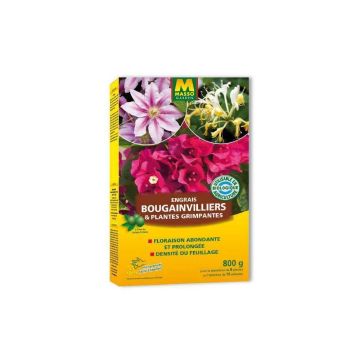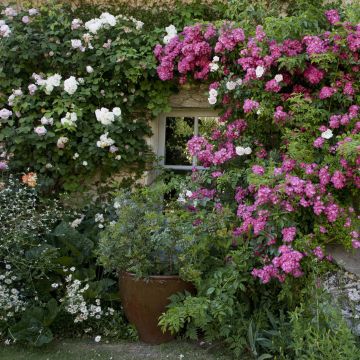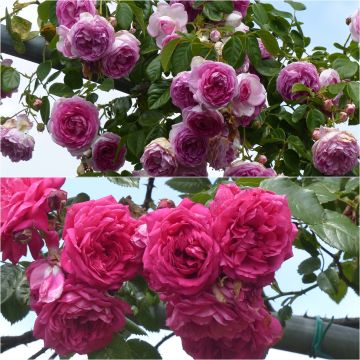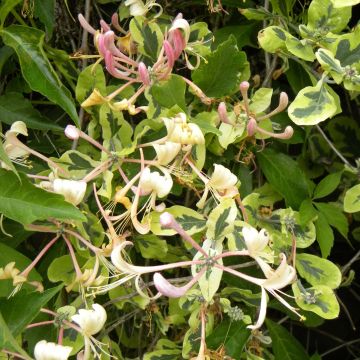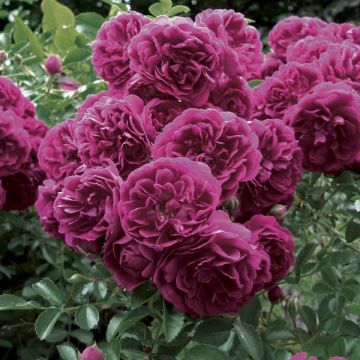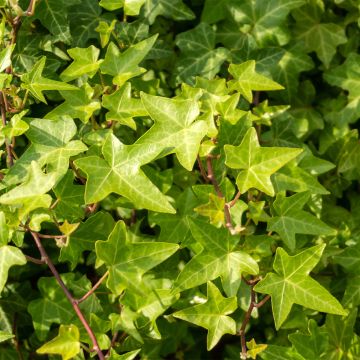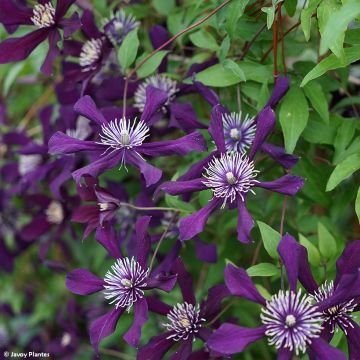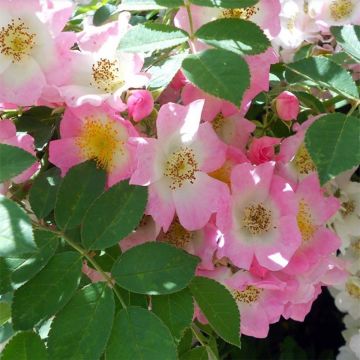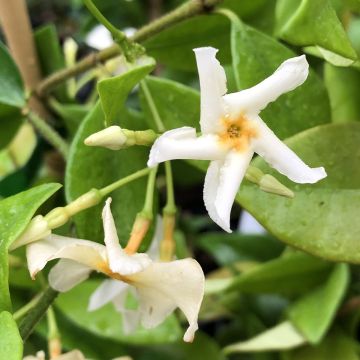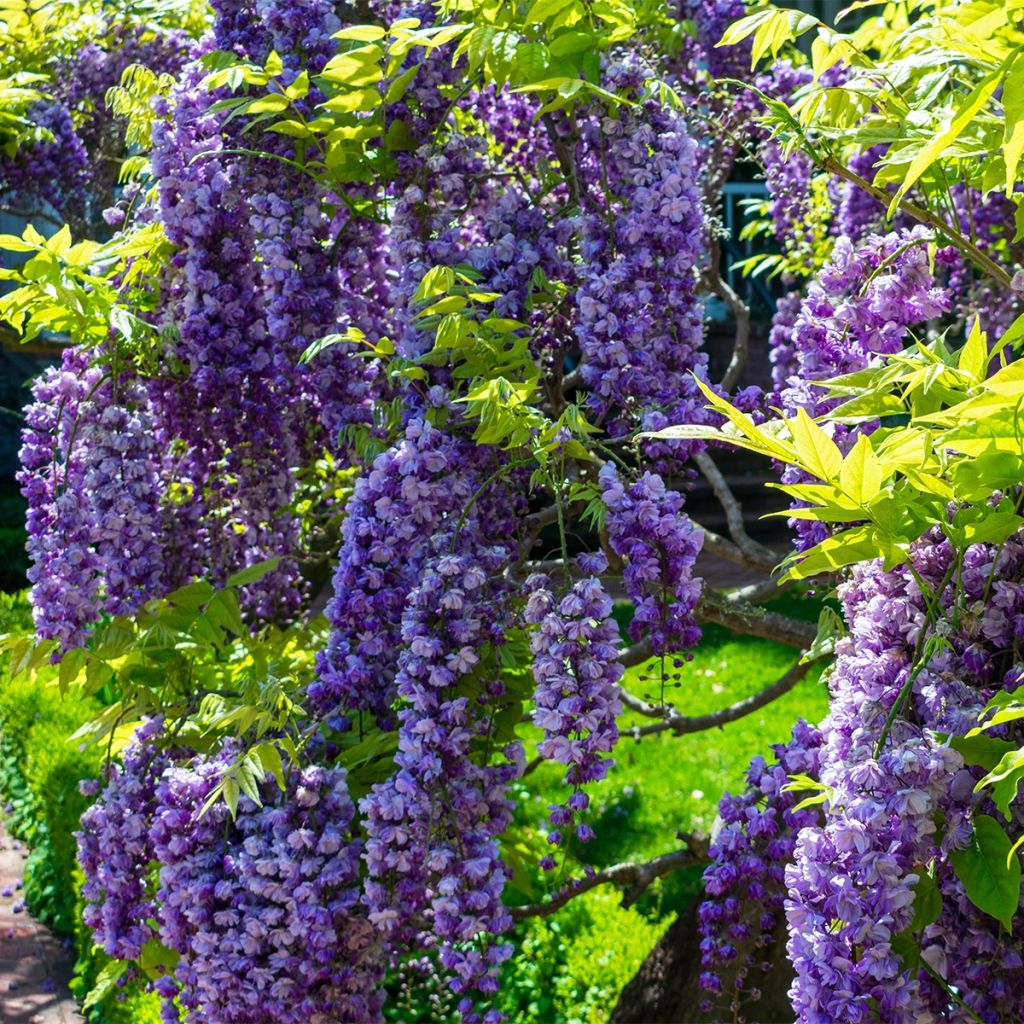

Wisteria sinensis Flore Pleno
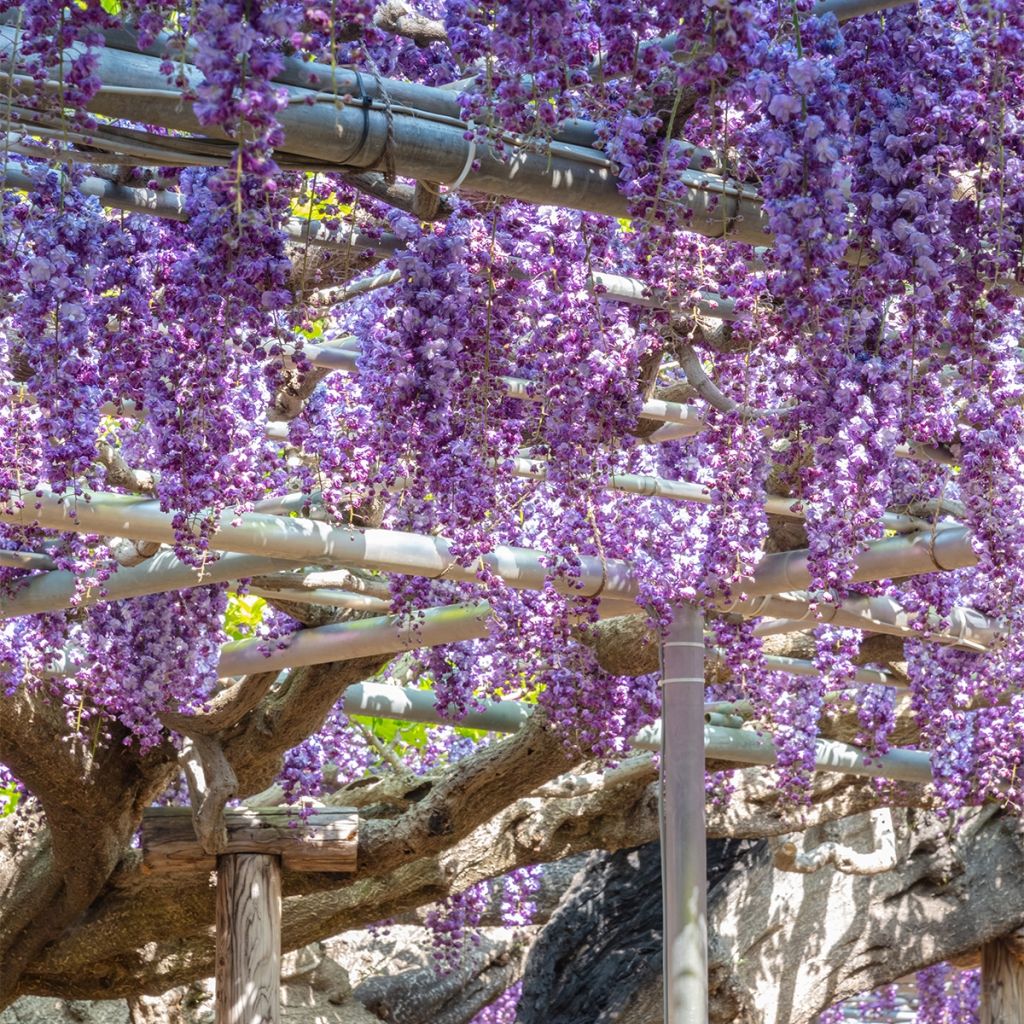

Wisteria sinensis Flore Pleno
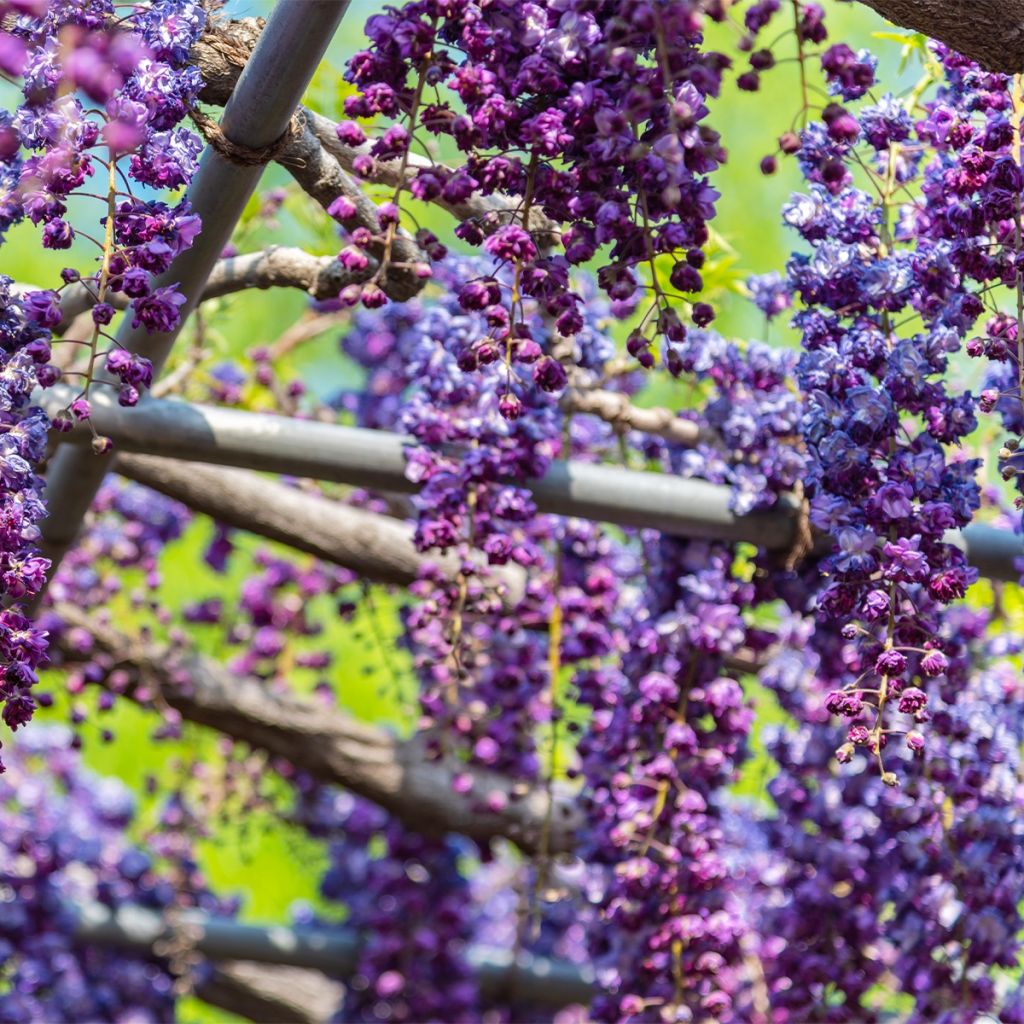

Wisteria sinensis Flore Pleno
Wisteria sinensis Flore Pleno
Wisteria sinensis Flore Pleno
Chinese Wisteria
This item cannot be shipped to the selected country
Oversize package delivery charge from €6.90
More information
Schedule delivery date,
and select date in basket
This plant carries a 6 months recovery warranty
More information
We guarantee the quality of our plants for a full growing cycle, and will replace at our expense any plant that fails to recover under normal climatic and planting conditions.
Oversize package: home delivery by special carrier from €6.90 per order..
Express home delivery from €8.90.
Does this plant fit my garden?
Set up your Plantfit profile →
Description
Wisteria sinensis 'Flore Pleno' is a wonderful form of the vigorous Chinese wisteria with double and fragrant flowers. Its long clusters of flowers display a delightful gradation of mauve tones, ranging from almost white to deep mauve. This exuberant climber blooms abundantly in spring, usually among its young bronze shoots, and often again in summer. Wisterias wrap their long voluble stems around trellises, arbours, and pergolas. These long, green and flexible tendrils eventually become so powerful that they can lift their supporting structure. Wisterias are extraordinarily beautiful, exceptionally vigorous, very accommodating, and resistant to the coldest winters.
Wisteria sinensis is a fast-growing climbing plant belonging to the large Fabaceae family. It is native to the humid forests of China, and was introduced to Europe in 1816. Its long voluble stems, which can reach 10m (33ft) in length, lignify with age. Sometimes a bit slow to establish, it is a robust plant that is perfectly resistant to cold. It is not demanding regarding soil (although it fears excessive active limestone), and can grow in poor and dry soils in summer if they are deep.
The 'Flore Pleno' form distinguishes itself with its double flowers and increased floribundity. Its stems easily reach 9 to 10m (29 to 33ft) in length and spontaneously wind around supports in an anti-clockwise direction. The growth of new, flexible, and villous shoots is very fast, reaching several metres in a season if planted in moist soil. The main flowering of this 'Flore Pleno' variety takes place in April-May, depending on the climate, on fairly young grafted plants. It develops on almost bare branches located not far from the lignified main stems. Clusters of flowers, 30 to 40cm (12 to 16in) long, spread a strong honey scent in calm weather. They open from the base to the tip of the cluster. The plant blooms again during summer, among the foliage. Its flowering is nectar-rich and honey-bearing. The young bronze leaves appear at the end of flowering and then turn a light green colour, ending in golden-yellow tones in autumn before falling. They are 15 to 30cm (6 to 12in) long and divided into 4 to 6 pairs of rounded leaflets, giving the foliage a light appearance. Chinese Wisteria can live well over 50 years.
Wisteria sinensis 'Flore Pleno' is the epitome of romantic plants. It is a queen in the realm of climbing plants that can enhance any facade or structure, no matter how modest it may be. This vibrant plant often survives in old, neglected gardens, climbing to the tops of tall trees. It is also particularly useful for covering a wall or an unsightly fence. It wraps itself around a trellis without restraint if left to its own devices, and tends to smother nearby plants. Plant it on its own, in full sun (or partial shade in hot climates). Alternatively, plant it with honeysuckles as powerful as itself, such as Lonicera x delavayi, which is evergreen with a fragrant yellow summer flowering. Chinese wisteria also gets along very well with Clematis montana.
However, be patient! The first flowers may not appear until after 2 to 3 years, sometimes longer depending on growing conditions.
Report an error about the product description
Wisteria sinensis Flore Pleno in pictures
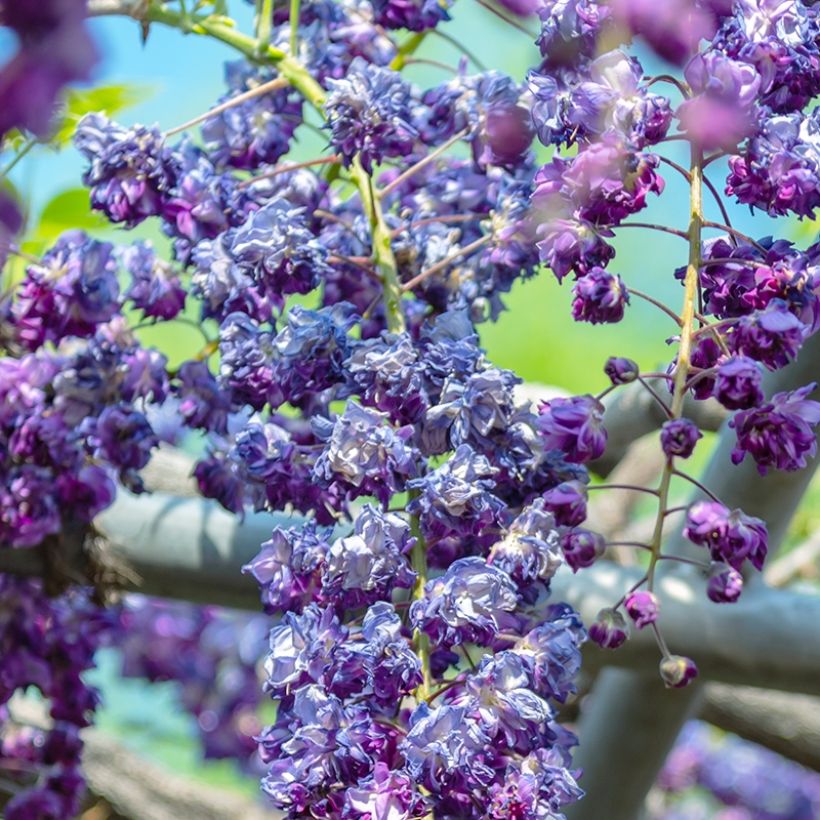

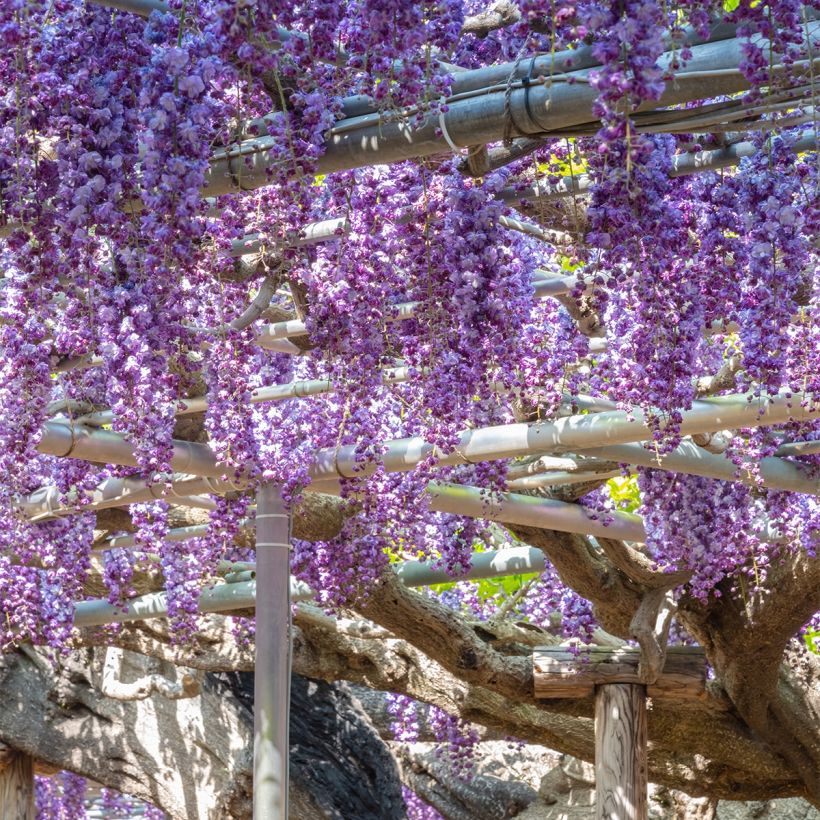

Plant habit
Flowering
Foliage
Botanical data
Wisteria
sinensis
Flore Pleno
Fabaceae
Chinese Wisteria
China
Other Wisterias
Planting and care
'Flore Pleno' is easy-to-grow if planted in sufficiently deep soil. It thrives in any garden soil, with a preference for poor soils. However, it prefers acidic to neutral soil and may wither in overly chalky soil. Once established, it is perfectly resistant to summer drought and requires no watering, even in hot regions. Plant it along a wall or train it on a pergola. Pruning is recommended for better flowering. To improve its hardiness, plant it in well-draining soil and train it on a south-facing wall to withstand harsh winters. Wisterias can be trained into tree form by raising them on a 1.5 to 2m (5 to 7ft) "parasol" stake, or used as ground cover.
Planting period
Intended location
Care
-
, onOrder confirmed
Reply from on Promesse de fleurs
Foolproof climbers
Haven't found what you were looking for?
Hardiness is the lowest winter temperature a plant can endure without suffering serious damage or even dying. However, hardiness is affected by location (a sheltered area, such as a patio), protection (winter cover) and soil type (hardiness is improved by well-drained soil).

Photo Sharing Terms & Conditions
In order to encourage gardeners to interact and share their experiences, Promesse de fleurs offers various media enabling content to be uploaded onto its Site - in particular via the ‘Photo sharing’ module.
The User agrees to refrain from:
- Posting any content that is illegal, prejudicial, insulting, racist, inciteful to hatred, revisionist, contrary to public decency, that infringes on privacy or on the privacy rights of third parties, in particular the publicity rights of persons and goods, intellectual property rights, or the right to privacy.
- Submitting content on behalf of a third party;
- Impersonate the identity of a third party and/or publish any personal information about a third party;
In general, the User undertakes to refrain from any unethical behaviour.
All Content (in particular text, comments, files, images, photos, videos, creative works, etc.), which may be subject to property or intellectual property rights, image or other private rights, shall remain the property of the User, subject to the limited rights granted by the terms of the licence granted by Promesse de fleurs as stated below. Users are at liberty to publish or not to publish such Content on the Site, notably via the ‘Photo Sharing’ facility, and accept that this Content shall be made public and freely accessible, notably on the Internet.
Users further acknowledge, undertake to have ,and guarantee that they hold all necessary rights and permissions to publish such material on the Site, in particular with regard to the legislation in force pertaining to any privacy, property, intellectual property, image, or contractual rights, or rights of any other nature. By publishing such Content on the Site, Users acknowledge accepting full liability as publishers of the Content within the meaning of the law, and grant Promesse de fleurs, free of charge, an inclusive, worldwide licence for the said Content for the entire duration of its publication, including all reproduction, representation, up/downloading, displaying, performing, transmission, and storage rights.
Users also grant permission for their name to be linked to the Content and accept that this link may not always be made available.
By engaging in posting material, Users consent to their Content becoming automatically accessible on the Internet, in particular on other sites and/or blogs and/or web pages of the Promesse de fleurs site, including in particular social pages and the Promesse de fleurs catalogue.
Users may secure the removal of entrusted content free of charge by issuing a simple request via our contact form.
The flowering period indicated on our website applies to countries and regions located in USDA zone 8 (France, the United Kingdom, Ireland, the Netherlands, etc.)
It will vary according to where you live:
- In zones 9 to 10 (Italy, Spain, Greece, etc.), flowering will occur about 2 to 4 weeks earlier.
- In zones 6 to 7 (Germany, Poland, Slovenia, and lower mountainous regions), flowering will be delayed by 2 to 3 weeks.
- In zone 5 (Central Europe, Scandinavia), blooming will be delayed by 3 to 5 weeks.
In temperate climates, pruning of spring-flowering shrubs (forsythia, spireas, etc.) should be done just after flowering.
Pruning of summer-flowering shrubs (Indian Lilac, Perovskia, etc.) can be done in winter or spring.
In cold regions as well as with frost-sensitive plants, avoid pruning too early when severe frosts may still occur.
The planting period indicated on our website applies to countries and regions located in USDA zone 8 (France, United Kingdom, Ireland, Netherlands).
It will vary according to where you live:
- In Mediterranean zones (Marseille, Madrid, Milan, etc.), autumn and winter are the best planting periods.
- In continental zones (Strasbourg, Munich, Vienna, etc.), delay planting by 2 to 3 weeks in spring and bring it forward by 2 to 4 weeks in autumn.
- In mountainous regions (the Alps, Pyrenees, Carpathians, etc.), it is best to plant in late spring (May-June) or late summer (August-September).
The harvesting period indicated on our website applies to countries and regions in USDA zone 8 (France, England, Ireland, the Netherlands).
In colder areas (Scandinavia, Poland, Austria...) fruit and vegetable harvests are likely to be delayed by 3-4 weeks.
In warmer areas (Italy, Spain, Greece, etc.), harvesting will probably take place earlier, depending on weather conditions.
The sowing periods indicated on our website apply to countries and regions within USDA Zone 8 (France, UK, Ireland, Netherlands).
In colder areas (Scandinavia, Poland, Austria...), delay any outdoor sowing by 3-4 weeks, or sow under glass.
In warmer climes (Italy, Spain, Greece, etc.), bring outdoor sowing forward by a few weeks.

































